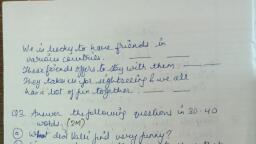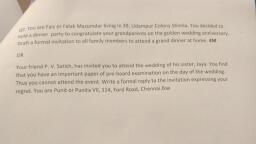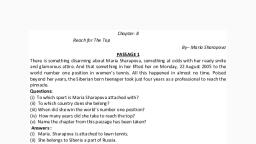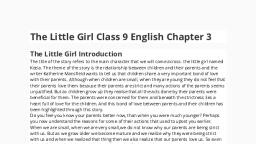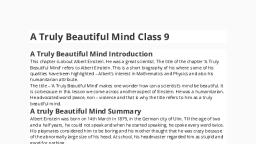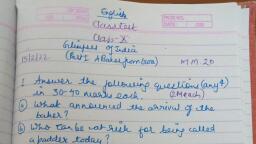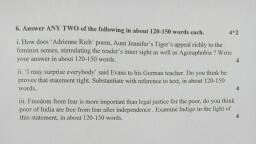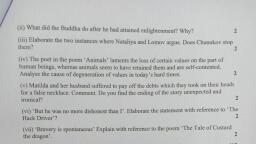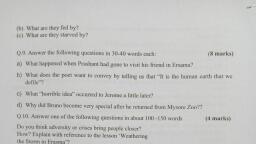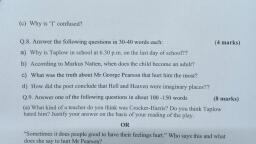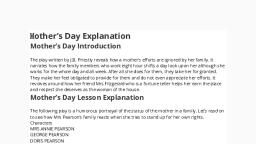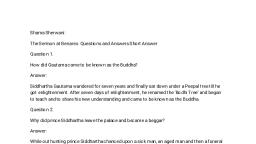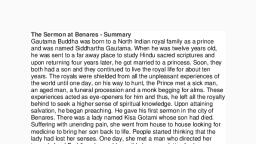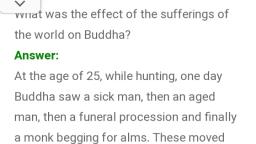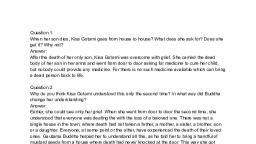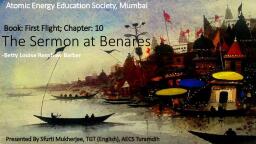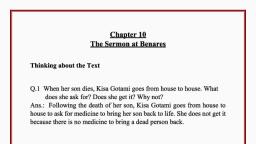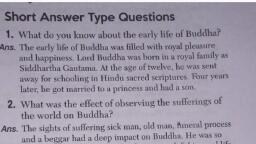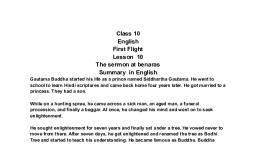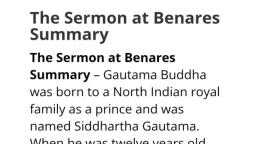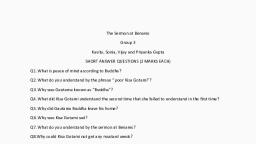Page 1 :
The Sermon at Benares introduction:, The Sermon at Benares throws light upon the early life of Lord Buddha who was originally born as a, prince in the royal family. On being exposed to the sufferings of the world which he was earlier shielded, from, he left his priesthood and went in search of salvation thus leaving all the worldly pleasures behind., Upon attaining spiritual awakening, he gave his first sermon in the city of Benares hereby making a lady, named Kisa Gotami realize that men are mortal and a wise person should not grieve at what is bound to, happen for it only enhances pain and suffering., Summary:Gautama Buddha was born to a North Indian royal family as a prince and was named Siddhartha, Gautama. When he was twelve years old, he was sent to a far away place to study Hindu sacred, scriptures and upon returning four years later, he got married to a princess. Soon, they both had a son, and they continued to live the royal life for about ten years. The royals were shielded from all the, unpleasant experiences of the world until one day, on his way to hunt, the Prince met a sick man, an, aged man, a funeral procession and a monk begging for alms. These experiences acted as eye-openers, for him and thus, he left all the royalty behind to seek a higher sense of spiritual knowledge. Upon, attaining salvation, he began preaching. He gave his first sermon in the city of Benares., There was a lady named Kisa Gotami whose son had died. Suffering with unending pain, she went from, house to house looking for medicine to bring her son back to life. People started thinking that the lady, had lost her senses. One day, she met a man who directed her towards Lord Buddha who could possibly, have a solution for her problem. Buddha asked her to look for mustard seeds and the seeds must be, procured from a house that had seen no death. Reinstated with hope, Kisa Gotami once again went on a, search from house to house but to her dismay, she could not find mustard seeds from a house that, would fulfill Buddha‘s condition. Disheartened, she sat at the edge of the road thus realizing how, selfish she had been. She became conscious to the fact that men were mortal and no one could escape, the cycle of life. This was exactly what Buddha wanted her to understand. According to Lord Buddha,, feelings of grief and sorrow only increase man’s pain and suffering thus, deteriorating his health., Therefore, a wise person fully aware about nature‘s functioning must not grieve at something bound, to happen and only then he can be happy and blessed., The Sermon at Benares Explanation, – GAUTAMA Buddha (563 B.C. – 483 B.C.) began life as a prince named Siddhartha Gautama, in, northern India. At twelve, he was sent away for schooling in the Hindu sacred scriptures and four years, later he returned home to marry a princess. They had a son and lived for ten years as befitted royalty. At, about the age of twenty-five, the Prince, heretofore shielded from the sufferings of the world, while out, hunting chanced upon a sick man, then an aged man, then a funeral procession, and finally a monk, begging for alms. These sights so moved him that he at once went out into the world to seek, enlightenment concerning the sorrows he had witnessed., Word meanings
Page 2 :
Sacred- embodying the laws or doctrines of a religion, Scriptures- the sacred writings of a religion, Befitted- be appropriate for; suit, Chanced upon- came across by chance, Alms- money or food given to poor people; charity, Enlightenment- a state of high spiritual knowledge, Gautama Buddha was born to a North Indian royal family as a prince and was named Siddhartha, Gautama. He was sent to a far away place when he was twelve years old to study Hindu sacred, scriptures and upon returning four years later, he got married to a princess. Soon, they both had a son, and they continued to live the royal life for about ten years. The royals were shielded from all the, unpleasant experiences of the world until the Prince met a sick man, an aged man, a funeral procession, and a monk looking for alms. These experiences acted as eye-openers for him and thus, he left all the, royalty behind to seek a higher sense of spiritual knowledge., He wandered for seven years and finally sat down under a peepal tree, where he vowed to stay until, enlightenment came. Enlightened after seven days, he renamed the tree the Bodhi Tree (Tree of, Wisdom) and began to teach and to share his new understandings. At that point he became known as, the Buddha (the Awakened or the Enlightened). The Buddha preached his first sermon at the city of, Benares, most holy of the dipping places on the River Ganges; that sermon has been preserved and is, given here. It reflects the Buddha‘s wisdom about one inscrutable kind of suffering., Word meanings, Wandered- to move without a fixed course, Vowed- solemnly promise to do a specified thing, Preached- deliver a religious address to an assembled group of people, Sermon- a talk on religious or moral subject, Holy- sacred, Dipping places- bathing, Inscrutable- something which cannot be understood, Gautama Buddha went in search of enlightenment for about seven years before he finally came across a, peepal tree and chose to sit under it till he became awakened. When he finally attained salvation after, 7 days, he decided to retitle the tree as the ‘Bodhi tree’ (which means the Tree of Wisdom) and he, himself came to be known as ‘Buddha’ (which means The Awakened). He even began preaching his
Page 3 :
new realizations and his first sermon was given in the city of Benares. The city of Benares is known to be, sacred as it resides on the banks of the river Ganges. The first sermon he gave was preserved and is, famous till date (It is given below as well). It gives a new perspective to man‘s unending sufferings., Kisa Gotami had an only son, and he died. In her grief she carried the dead child to all her neighbours,, asking them for medicine, and the people said, “She has lost her senses. The boy is dead.” At length,, Kisa Gotami met a man who replied to her request, “I cannot give thee medicine for thy child, but I, know a physician who can.” And the girl said, “Pray tell me, sir; who is it?” And the man replied,, “Go to Sakyamuni, the Buddha.” Kisa Gotami repaired to the Buddha and cried, “Lord and Master,, give me the medicine that will cure my boy.”, It talks about a lady named Kisa Gotami whose son had recently died. Struck with unending pain and, sorrow, she took her son door to door requesting for a wonder drug that could bring his son back to life., Quite obviously, everyone thought that the lady had lost her ability to think clearly. Going on from door, to door, she finally came across a man who couldn‘t offer any medicine but led her to Sakyamuni, the, Buddha. Filled with hope, the lady visited Gautama Budhha and begged him for a cure for her child., The Buddha answered, “I want a handful of mustardseed.” And when the girl in her joy promised to, procure it, the Buddha added, “The mustard-seed must be taken from a house where no one has lost a, child, husband, parent or friend.”, Just as the man said, Gautama Buddha had a solution. He asked Kisa Gotami to get a handful of mustard, seeds. Restored with hope, Kisa Gotami thought it to be a very simple task until Lord Buddha instilled a, condition that “The mustard-seed must be taken from a house where no one has lost a child, husband,, parent or friend.”, Poor Kisa Gotami now went from house to house, and the people pitied her and said, “Here is, mustardseed; take it!” But when she asked, “Did a son or daughter, a father or mother, die in your, family?” they answered her, “Alas! The living are few, but the dead are many. Do not remind us of, our deepest grief.” And there was no house but some beloved one had died in it., Once again, Kisa Gotami went from door to door, but this time, she was looking for mustard seeds., Many had mustard seeds to offer but none of them could fulfill Lord Buddha‘s condition of having, seen no deaths in the family. Upon being asked, people requested her not to remind them of their, deepest griefs. Unfortunately, she couldn’t find a suitable home to get mustard seeds for his son., Kisa Gotami became weary and hopeless, and sat down at the wayside watching the lights of the city, as, they flickered up and were extinguished again. At last the darkness of the night reigned everywhere., And she considered the fate of men, that their lives flicker up and are extinguished again. And she, thought to herself, “How selfish am I in my grief! Death is common to all; yet in this valley of desolation, there is a path that leads him to immortality who has surrendered all selfishness.”
Page 4 :
All hope was lost for Kisa Gotami and thus, in extreme anguish and pain, she found herself a place to, ponder at the edge of the road. She continuously watched city lights blinking and observed them till, there was just darkness all around. After deep reflection, she realised that man‘s fate was just like, these city lights that flicker and extinguish repeatedly. The cycle of birth and death is nature’s way of, working. Suddenly, she became conscious as to how selfish she had been in her sorrow and that one, who was born must rest eternally. Men are mortal and the ones that are immortals have covered a path, free from all worldly pleasures., The Buddha said, ‘‘The life of mortals in this world is troubled and brief and combined with pain. For, there is not any means by which those that have been born can avoid dying; after reaching old age there, is death; of such a nature are living beings. As ripe fruits are early in danger of falling, so mortals when, born are always in danger of death. As all earthen vessels made by the potter end in being broken, so is, the life of mortals. Both young and adult, both those who are fools and those who are wise, all fall into, the power of death; all are subject to death., According to Lord Buddha, the life of mortals is troubled because they have not made peace with the, fact that the one who is born, must rest eternally. There is no way a living being can avoid facing death., Just like a ripe fruit is more prone to falling, an aged mortal is bound to die. Just like all earthen vessels, break at some point, so do men. Whether old or young, foolish or wise, death leaves none., “Of those who, overcome by death, depart from life, a father cannot save his son, nor kinsmen their, relations. Mark! While relatives are looking on and lamenting deeply, one by one mortals are carried off,, like an ox that is led to the slaughter. So the world is afflicted with death and decay, therefore the wise, do not grieve, knowing the terms of the world., Word meanings, Kinsmen- a man who is one of a person‘s blood relations, Lamenting- express regret or disappointment about something, Slaughter- killing of animals for food, Afflicted- affect adversely, The only way death works is by withdrawing the person from the living world i.e, the person ceases to, exist. No one has control over death, neither a father can save his son nor a kinsmen his relative. Just, like an ox is taken to the slaughter house to be killed, so does death do with mortals, leaving none, behind. Thus, the one who knows this truth and doesn‘t grieve at his loss is the one who has been, called wise by Lord Buddha., “Not from weeping nor from grieving will anyone obtain peace of mind; on the contrary, his pain will, be the greater and his body will suffer. He will make himself sick and pale, yet the dead are not saved by, his lamentation. He who seeks peace should draw out the arrow of lamentation, and complaint, and
Page 5 :
grief. He who has drawn out the arrow and has become composed will obtain peace of mind; he who, has overcome all sorrow will become free from sorrow, and be blessed.”, According to Lord Buddha, one should not grieve, weep or be miserable at something which is bound to, happen for it will keep man away from obtaining peace of mind. It will only multiply the pain and, suffering thus leading to physical weakness and moreover, no amount of grief would bring back the, dead. It is very important to understand that one must move past feelings like sorrow and grief as it is, the only way that leads to the path of salvation., The Sermon at Benares Question Answers, 1. Hen her son dies, Kisa Gotami goes from house to house. What does she ask for? Does she get, it? Why not?, When her son dies, Kisa Gotami goes from house to house requesting for a wonder drug that could bring, her son back to life. No, she could not get it because there is no medicine that can bring a dead man, back to life., 2. Kisa Gotami again goes from house to house after she speaks with the Buddha. What does she, ask for, the second time around? Does she get it? Why not?, Upon seeing the Buddha, Kisa Gotami is refilled with hope and thus, she goes again from house to house, looking for mustard seeds just as Lord Buddha had asked her. Many had mustard seeds to offer but, none of them could fulfill Lord Buddha‘s condition of having seen no deaths in the family. Therefore,, she couldn’t find mustard seed for her son., 3. What does Kisa Gotami understand the second time that she failed to understand the first time?, Was this what the Buddha wanted her to understand?, When Kisa Gotami failed to find mustard seeds that could fulfill Lord Buddha‘s condition of having, seen no deaths in the family, she became disheartened. After deep reflection, she realised that the, man’s fate was just like the city lights that flickered and extinguished repeatedly. The cycle of birth and, death was nature‘s way of working. Suddenly, she became conscious as to how selfish she had been in, her sorrow and that one who was born must rest eternally. Men are mortal. Yes, this is exactly what, Lord Buddha wanted her to understand., 4. Why do you think Kisa Gotami understood this only the second time? In what way did the, Buddha change her understanding?, Kisa Gotami was too overwhelmed with sorrow and pain that her ability to think clearly got clouded. She, couldn‘t realise that no one can escape the cycle of death. When Kisa Gotami failed to find mustard, seeds that could fulfill Lord Buddha’s condition of having seen no deaths in the family, she became, disheartened. After deep reflection, she made peace with the terms of the world. Lord Buddha played a, major role in facilitating the shift in her understanding by teaching her a lesson that one must not grieve, for what is bound to happen for it will only deepen the pain and suffering.
Page 6 :
Extra Questions :Question 1., The Buddha preached his first sermon at the city of Benares, most holy of the dipping places on the, River Ganges; that sermon has been preserved and is given here. It reflects the Buddha‘s wisdom, about one inscrutable kind of suffering, (a) Where did Buddha preach his first sermon?, (b) What does the sermon preached by Buddha reflect?, © ‘Find the exact word from the extract which means impossible to understand’., (d) How Benares is described in the lesson?, Answer:, (a) Buddha preached his first sermon at Benares., (b) It reflects Buddha‘s wisdom about one inscrutable kind of suffering., © ‘Inscrutable’ from the extract means ‘impossible to understand’., (d) Benares is described in the lesson as the most holy of the dipping places on the river Ganges., Question 2., GAUTAMA Buddha (563 B.C.- 483 B.C.) began life as a prince named Siddhartha Gautama, in northern, India. At twelve, he was sent away for schooling in the Hindu sacred scriptures and four years later he, returned home to marry a princess. They had a son and lived for ten years as befitted royalty., (a) Who was Gautama Buddha?, (b) What did Gautama Buddha study?, © Find the exact word from the extract whii means ‘people of royal family’. ‘, (d) When did Gautama Buddha marry?, Answer:, (a) Gautama Buddha was a prince born in North India., (b) Gautama Buddha studied Hindu Sacred Scriptures., © ‘Royalty’ from the extract means ‘people of royal family’., (d) Gautam Buddha married after his schooling at the age of sixteen years.
Page 7 :
Question 3., At about the age of twenty-five, the Prince, heretofore shielded from the sufferings of the world, while, out hunting chanced upon a sick man, then an aged man, then a funeral procession, and finally a monk, begging for alms. These sights so moved him that he at once went out into the world to seek, enlightenment concerning the sorrows he had witnessed., (a) Why did Gautama Buddha go out to seek enlightenment?, (b) What did Gautama Buddha see while hunting?, © Find the exact word from the extract which means ‘a state of high spiritual knowledge’., (d) Describe the thought of Gautam Buddha while he encountered with the different stages, of life., Answer:, (a) Gautama Buddha was highly moved by seeing the sufferings of man. So he went out to seek, enlightenment., (b) Gautama Buddha chanced upon a sick man, then an aged man, then a funeral procession,, and finally a monk begging for alms while hunting., © Enlightenment‘ from the extract means ‘a state of high spiritual knowledge’., (c) Gautam Buddha was so upset and worried while encountering the different stages of life as a, sickman, an aged man, a funeral and a monk begging for alms., Question 4., He wandered for seven years and finally sat down under a peepal tree, where he vowed to stay, until enlightenment came. Enlightened after seven days, he renamed the tree the Bodhi Tree, and began to teach and to share his new understandings. At that point he became known as the, Buddha., (a) What was the name of the peepal tree under which Buddha sat?, (b) What did Buddha do while sitting under the tree?, © Find the exact word from the extract which means ‘solemnly promise to do a specified, thing’., (d) After how many days Gautam Buddha got enlightenment?, Answer:, (a) The name of the peepal tree under which Buddha sat was Bodhi tree., (b) Buddha began to teach and share his new understandings while sitting under the tree., © ‘Vowed’ from the extract means ‘solemnly promise to do a specific thing’., (e) Gautam Buddha got enlightenment after seven days of his vow that he would sit until, enlightenment came., Question 5.Poor Kisa Gotami now went from house to house, and the people pitied her and, said, “Here is mustard-seed; take it!” But when she asked, “Did a son or daughter, a, father or mother, die in your family?” they answered her, ‘Alas! The living are few, but
Page 8 :
the dead are many. Do not remind us of our deepest grief.“ And there was no house but, some beloved one had died in it., (a) Why did Kisa Gotami travel from house to house?, (b) What did Kisa Gotami ask before taking the mustard seeds?, © Find the exact word from the extract which means ‘dearly loved’., (d) What did the people reply Kisa Gotami when she asked about the death of a, family member?, Answer:, (a) Kisa Gotami travelled from house to house to collect mustard seeds., (b) Kisa Gotami asked everyone before taking the mustard seeds whether a family member, had ever died in their family or not., © ‘beloved’ from the extract means ‘dearly loved’., (d) The people replied Kisa Gotami that there was no house but some beloved one had died, in it and she should not remind them of their deepest grief., Question 6., “Not from weeping nor from grieving will anyone obtain peace of mind; on the contrary,, his pain will be the greater and his body will suffer. He will make himself sick and pale, yet, the dead are not saved by his lamentation. He who seeks peace should draw out the arrow, of lamentation, and complaint, and grief.”, (a) Who said these lines?, (b) How can a person seek peace?, © Find the exact word from the text which means ‘to express sadness about something’., (c) What effect does the weeping or grieving have on us?, Answer:, (a) Buddha said these lines., (b) The person who seeks peace should draw out the arrow of lamentation, complaint and, grief., © ‘lamentation’ from the extract means ‘to express sadness about something., (d) Weeping or grieving makes our pain greater than before. The person will make himself sick, and pale., Short Answer Type Questions:Question 1., Why did Prince Siddhartha leave the palace and become a beggar?, Answer:
Page 9 :
Once Prince Siddhartha, while hunting saw a sick man, then an aged man, then a funeral, procession and finally a monk begging for alms. Looking at this, he left the palace and, became a beggar to search for enlightenment., Question 2., What do you know about the early life of Buddha?, Answer:, Gautama Buddha was born in a royal family. His childhood name was Siddhartha. At the age, of 12, he was sent away for schooling in Hindu sacred scriptures and four years later he got, married to a princess., Question 3., Where did Buddha preach his first sermon?, Answer:, Gautama Buddha preached his first sermon at the city of Benares, which is regarded as the, holiest of the bathing places on the river Ganges., Question 4., How did Kisa Gotami realise that life and death is a process?, Kisa Gotami went from house to house but was unable to find one house where nobody had, died. She was tired and hopeless and sat down at the wayside watching the lights of the city, as they flickered up and were extinguished again. She realised that similar to the city lights, human lives also flicker up for some time and are extinguished again., Question 5., What was the effect of the sufferings of the world on Buddha?, Answer:, At the age of 25, while hunting, one day Buddha saw a sick man, then an aged man, then a, funeral procession and finally a monk begging for alms. These moved him so much that he, went out into the world to seek enlightenment., Question 6.According to Kisa Gotami what is the greatestgrief of life?, Answer:, According to Kisa Gotami, the greatest grief in life is the death of one‘s loved ones and, one’s inability to stop them from dying. Therefore, instead of lamenting on it, the wise, should not grieve. Weeping will only increase the pain and disturb the peace of mind of a, person., Question 7., Why was Kisa Gotami sad? What did she do in her hour of grief?, Answer:
Page 10 :
Kisa Gotami was sad over the death of her only son. In the hour of grief, she went door to, door in order to find medicine for her son that could bring him to life., Question 8., What did the Buddha do after he had attained enlightenment?, Answer:, When Buddha Attained enlightenment, he started preaching and telling people about life, and its meaning. He spread his preachings far and wide so that people, Long Answer (Value Based) Type Questions:Question 1., Life is full of trials and tribulations. Kisa Gotami also passes through a period of grief in her, life. How does she behave in those circumstances?, Answer:, After the death of Kisa Gotami‘s only child, she became very sad. She carried her dead, child to her neighbours in order to get medicine to bring him to life. Her neighbours thought, that she had gone insane as she was unable to accept the fact that. It was then that, someone suggested her to meet Gautama Buddha. When she met Gautama Buddha he gave, her an exercise to do.She was asked to collect mustard seeds from a house where no one, has ever died. She went from one house to another but was unable to find a single house, where no one has died. This way she realised that death is a part of life and anyone who is, born is bound to die one day. Thus, Buddha changed her understanding of death by this, exercise. Could come to terms with the truth., Question 2., Personal losses are a part and parcel of life. Instead of wailing on them, we should move on, in life. This message of Gautama Buddha has become more relevant in modern times. Do, you agree ? Why /why not?, Answer:, Yes, I agree with the message that Gautama Buddha has given about life. In the modem, times, people have a lot to explore and move with the world at the same pace. If people don, ‘t understand the practicality of life, they will be under stress which would in turn affects,, their personal and professional lives. People need to understand that everyone who is born, will have to die one day. There is no use being sad or crying over the loss. People should, remain calm and composed in such situations. They should face the truth and move on in, life., Question 3., What did Buddha say about death and suffering?, Answer:
Page 11 :
After enlightenment, Buddha started to spread his teachings about life, truth and the likes, of it. He told that death and suffering are the part and parcel of life. None can avoid this, truth. One has to meet one‘s destined end one day. Whoever has come to the world, will, die one day. In the hour of grief, one must remain calm and composed so that grief doesn’, t overcome one. People who are wise, never complain or lament over their loss.They accept, the truth and be blessed with it. So, the wisdom lies in the fact that people should not get, distressed with pain, suffering and death.
